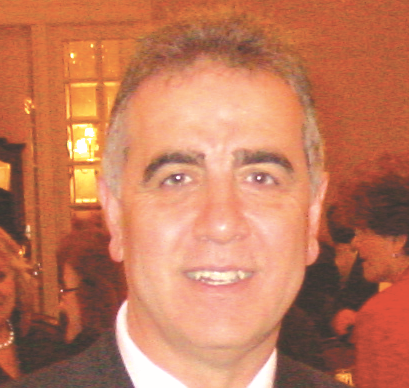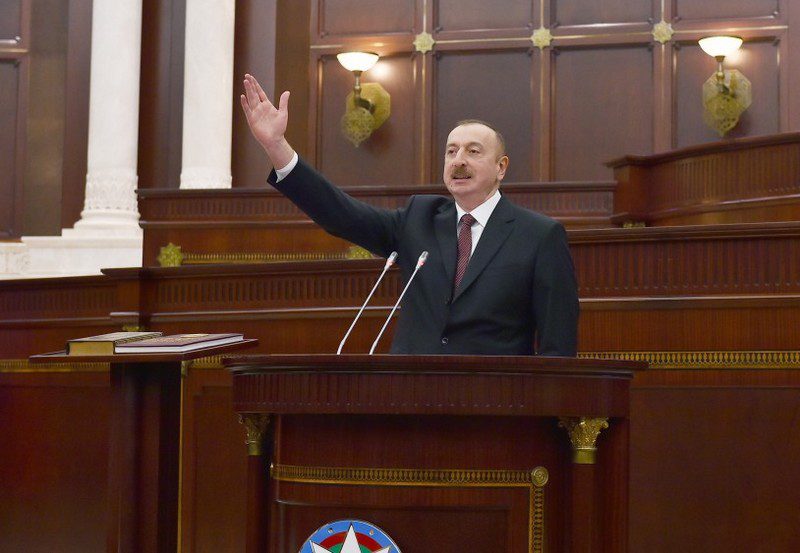(Second and Final Part)
Israel’s international TV station, i24NEWS, aired on January 27 a program that sang the praises of Azerbaijan-Israel military relations and denigrated Armenia and Iran. Last week, we published part 1 of the program. Here is the second and final part. My comments are in brackets:
Henrique Cymerman, an Israeli journalist, narrated the program: “Military relations between Azerbaijan and Israel are getting closer by the minute. Between 2016 and 2020, 69% of Baku’s weapons, drones and electronic systems were purchased from Israel. Almost one-fifth of Israeli war materials were exported and sent to Pres. Aliyev’s country. Roman Gurevich is an Israeli political analyst born in Baku. He focuses on relations between the two countries: ‘In the State of Israel, we are taking 40% of our fuels from Azerbaijan. Azerbaijan uses our technology and we have very important strategic issues in common.’ At the beginning of the 20th Century, Baku was already the world capital of oil production. A century ago, half of the world’s oil was produced in Azerbaijan. In addition, during the Communist era in the 1930’s, the dictator Joseph Stalin decided to increase production to the maximum level. After the break of the Second World War, Hitler’s birthday cake did not leave room for doubt [‘Caspian Sea’ was written on his cake]. The goal: to conquer the Caspian Sea, and the cherry on the cake, the City of Baku. The Nazis didn’t succeed. That also contributed to the victory of the allies, since 75% of all the oil of the Red Army during the war was from Azerbaijan.”
The Israeli journalist continued: “Baku’s government claims its coalition with Israel is not directed against anyone. But for the regime of the Ayatollah, it is very hard to see how a country with a Muslim majority, and totally Shia, maintains such deep ties with the Jewish State, Iran’s most hated enemy.” Former Israeli Minister Efraim Sneh added: “We are in favor of a strong independent, secular Azerbaijan. And this is the basis of why we are together. In that way, this is very important: oil from Azerbaijan to Israel, defense equipment from us to them. Very important. And we are more involved, people to people, cultural relations. But the basis is energy and defense.”
The narrator then said: “The first President of Azerbaijan Heydar Aliyev [Heydar was not the first President], father of the current president, decided on his alliance with Israel which remains to this day, and has Tehran as a common rival. In 2016, Israeli arms sales were estimated to be worth $2.85 billion. Pres. Aliyev decided that the former Soviet Republic would become the first Shiite Muslim state to open a diplomatic mission in Israel. In recent weeks, Baku’s Secret Services have managed to dismantle an Iranian spy network in the capital. Three agents from Tehran received information from several local citizens with whom they met with a clandestine phone. The Iranian side regularly paid for their services. Azerbaijan’s Security Services claimed that the ultimate goal of this network is to radicalize the country and contribute to the creation of an Islamic State, following the model of the Ayatollah. The President of Azerbaijan declared that religion is like an iceberg — much of it is hidden under water.” Gurevich added: “The second war took place two years ago in 2020 after Armenian soldiers killed two senior officers of the Azerbaijani army [11th lie]. The result is that Azerbaijan reacted and liberated almost all of the occupied territories. When Armenians occupied Azerbaijan, the Iranians didn’t threaten Armenia. They chose to threaten Azerbaijan now [12th lie], after liberating the territory. It’s a very strange thing and a very strange alliance. …Azerbaijan is stronger after this victory with the rapprochement between Israel and Turkey. Iranians are under pressure. Instead of building good ties between neighbors, Iran is creating problems for the whole world.”
The narrator continued: “In the destroyed areas of Karabagh, the Baku government is trying to resettle thousands of refugees. That’s why they are building the first smart cities which are still pilot projects. Refugees resulting from the war with Armenia are settled in areas that were completely destroyed. One of the problems is that the border areas are completely mined. Special army units and civilian companies try to clear the land from booby-traps, but this is a never-ending job….”
The narrator concluded: “The two armed conflicts between Azerbaijan and Armenia exist in a delicate ceasefire. And there are those who say that there aren’t two without a third. But this tense situation is further complicated by Iran’s nuclear race which is closer than ever to having enough uranium to build a nuclear bomb. For Iran to have Israeli agents on its border as allies of Azerbaijan is like having a knife to its throat. On the other hand, the Jewish State will do anything to prevent the Ayatollahs from carrying out their apocalyptic threats. It is like a three-person billiard game, if not more.”
The documentary ended here. The narrator, Israel journalist Henrique Cymerman, was then interviewed live on the Israeli channel. Cymerman said: “I think that Iran is really the reason for this alliance between Israel and Azerbaijan, which is huge. It’s really important. It’s strategic for both countries. I think this opening of [Azerbaijan’s] Embassy [in Israel] is the result of a very long process. It’s also a way of saying to Tehran, ‘guys, we have a new ally. We have a new friend in the last years, but we want to go all the way….’ And in a way, it’s a message for the Iranians, but it’s also a way of saying to Israel that they want more. They want more relations. I think they improved their strategic situation in their area of the world which is quite problematic. I was in the 700 hundred kilometers of the border between Azerbaijan and Iran, and I saw many things on the Iranian side. There were exercises and maneuvers — I tell about in the report — that are quite threatening for Azerbaijan. So they want Israel as a friend. And that’s exactly what’s happening now.”
When asked if Azerbaijan is concerned about the “powerful enemy, Iran,” Cymerman replied: “Absolutely. They are very concerned. And I think there were also these two wars they had against Armenia in the last 30 years that contributed to this alliance with Israel. Because 30 years ago they had a war when the Russians supported the Armenians [13th lie], and they lost. They lost 20% of their territory [it was much less than 20%], which is incredible, because it’s like 10,000 square kilometers, it’s like the Lebanese territory — half of Israel. So they lost it and one million Azeri people [it was much less than a million], they say, became refugees. So, now two years ago, in the second Karabagh War, they won because of Israeli technology. I think the Israeli military technology helped them to defeat their enemies, in this case, Armenia. But they also have the Iranian threat. So, they sent a message to Iran saying, ‘now we have new technologies, we have Israel.’ The Azeri President even had an Israeli drone in the picture. In a way, it’s a kind of psychological war, showing that this alliance is really deep and important. They mean business in this relation with Israel.”



